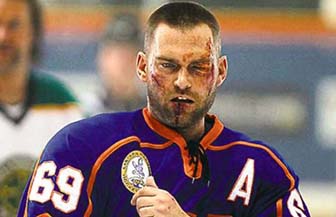|
|
Movie Review: GoonBy Matthew HuntleyApril 10, 2012
After Doug shows improvement, the coach thinks he could go even further and recommends him for a spot on the minor league team, the Halifax Highlanders. Doug moves in with a Frenchman named Xavier Laflamme (Marc-André Grondin), who was once thought to be the next great hockey player until Ross “The Boss” Rhea (Liev Schreiber) body checked him so hard it gave Laflamme a concussion and made him timid on the ice, causing him to lose confidence and underperform. But Doug thinks it’s his duty to protect his new teammates and feels a real sense of pride and camaraderie among them, even though they don’t always respond in kind. The same goes for the cute Eva (Allison Pill), a local girl who immediately strikes Doug with love at first sight. Soon enough, his goodness starts to grow on her, just as it’s already grown on us. Goon doesn’t go anywhere new or even exciting. It’s bound by too many inevitabilities, like the idea that Doug and Ross will eventually meet on the ice and duke it out in an ultimate fist fight; or that the Highlanders’ season will boil down to the very last game; or that Laflamme will somehow find a way to get his groove back. We’re also dealt the all too common cliché of the unsupportive parents thinking their son is wasting his time playing such a barbaric sport. The parental figures are so grossly underwritten that it would have been better to simply eliminate them from the screenplay. The movie is also padded with tired, juvenile humor, courtesy mostly of Baruchel’s Ryan, who drops the F-bomb every other sentence and makes crude sexual jokes. We’ve seen and heard this all before and it’s not like Baruchel puts a new spin on it. And the way the movie paints Doug’s stupidity is a tad extreme, often to the point where it’s too unbelievable. Would a guy like Doug really trip over his own words so much? But for all its gritty and graphic violence (the effects of which are actually executed quite well) and uninspiring vulgar humor, the movie is harmless and even contains a few laugh-out-loud moments, especially in the scenes where Doug is learning how to play hockey or just being himself. It’s funny, but I would have preferred a movie where we get to simply watch Doug be Doug and not have the plot revolve around hockey at all. Doug the person is much more interesting, thanks to Scott’s surprisingly genuine performance. He creates such a gentle and lovable character, one whom we believe wholeheartedly, that we can forgive the movie for its other shortcomings. Schreiber is good, too, and he and Scott share a well written scene in which Ross compares being a sports star to being a soldier: “they only like you when you’re fighting the war.” While there’s some truth to that, it doesn’t apply to Doug. We like him both on and off the ice.
|

|
|
|

|
Thursday, October 31, 2024
© 2024 Box Office Prophets, a division of One Of Us, Inc.


